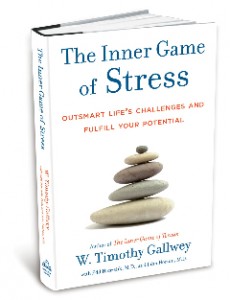Kristie McNealy, MD author of the blog “Healthy Living at Home” recently posted this entry about her insight into the new book by Tim Gallwey and Drs. Edd Hanzelik and John Horton.
Back while I was on bedrest, I spent some time reading a new book, The Inner Game of Stress: Outsmart Life’s Challenges and Fulfill Your Potential. It was pretty good timing, because stress over the baby’s well being and the challenges of managing our household while horizontal on the couch had pretty much overwhelmed me. I’m really glad I worked through the stress that was making it hard for me to read a whole paragraph from beginning to end, and really got into this book. Once I did, I read the whole thing in one night!

The Inner Game of Stress
After I read The Inner Game of Stress, I also got the chance to ask the authors a few questions to pass along to all of you! Here’s what they had to say.
Question: What kind of physical complaints can be caused by stress? Are these symptoms “all in our head”, or are the serious problems?
Edd Hanzelik: Almost any physical symptom can be caused or worsened by stress including headaches, chest pain, palpitations, asthma, all GI symptoms, increased susceptibility to colds and other infections, skin rashes, menstrual irregularities, etc., etc. These symptoms are not in the mind; they are in the body, caused by the great chemical imbalance in the body produced by chronic stress.
Question: If stress is so bad for our bodies, why does it exist in the first place?
Edd: Stressors (things that cause stress) exist because we are finite creatures and everything does not go the way we want. Stress inside our body is inevitable when we respond to these challenges with our mammalian stress system (fight/flight/freeze). Our human stressors need a uniquely human response, that maintains our core of stability.
Question: If you only had time to teach someone one tool for dealing with their stress, what would it be?
Tim Gallwey: If I could only teach someone one tool for dealing with their stress it would be the STOP tool. It is easy and effective. It separates the person from their stress momentum long enough that they can reflect and switch from the stress system to the wisdom system. The only hard thing about the STOP tool is remembering to use it when you really need it.
Edd: I would use the STOP tool. When a person begins to feel stress, the need to Step back and Think about their situation. During their reflection, they need to be clear that they want to avoid stress and they can consider their options to deal with their stressors. They Organize these reflections into a strategy. Then they Proceed to handle their challenging situation on their own terms. By STOPping, people can realize the options they have to handle life’s challenges without getting stressed.
Disclosure: I was provided with a copy of The Inner Game of Stress to review.
